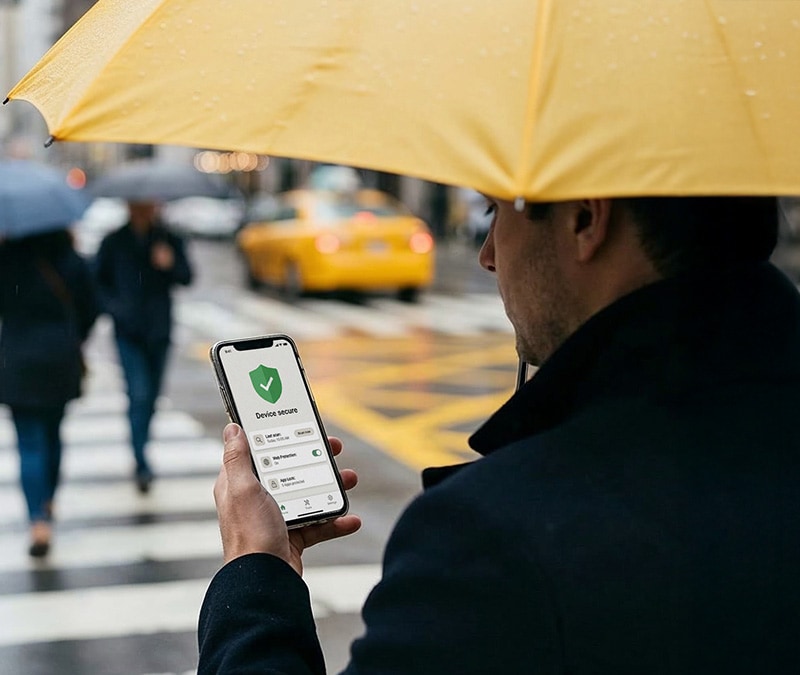Do my apps truly need to have so much access to work?
Yes, apps need access for some features to work. Having said that, some apps like to overreach. Here’s how you can manage app permissions to help you stay Cyber Safe.

Ever downloaded an app, clicked “Allow,” and moved on without a second thought? You’re not alone. However, you may need to go back to review those permissions you granted. These split-second decisions can be riskier than they seem. Some apps may request permissions that go beyond what's necessary, exposing you to potential data misuse.
Here's what you need to know about app permissions to avoid, so you can help keep your private information safer.
What are app permissions?
App permissions are requests that apps make to access specific features or data on your device. For example, a photo editing app might request access to your camera and photo gallery, or a fitness app might ask for location access to track your runs. While some permissions are essential, others may overstep—like a flashlight app asking for your contacts or the ability to place phone calls. (And yes, that happened.)
When you accept these permissions, you're giving the app access—at times, even when you’re not actively using the app. This access can include sensitive data like your location, contacts, or even your microphone. This can expose your personal information to risks like misuse or even being sold to third parties.
What are the risks of app permissions?
Granting permissions without caution can lead to privacy and security risks. Here are some of the biggest concerns:
- Malware: Malicious apps can exploit permissions to install harmful software on your device.
- Unchecked location tracking: Apps with location permissions can monitor your movements in real time and may share that information with third parties.
- Identity theft: Apps with access to sensitive data, like contacts, photos or emails, can make you vulnerable to identity theft if breached.
- Financial fraud: Permissions to access payment information could lead to unauthorized transactions or theft.
Which app permissions should you avoid
It all depends. Some app permissions should raise red flags, especially for apps that don't clearly need them to function. Think about the flashlight app example and always ask yourself if the access requested makes sense for the app.
With that in mind, these are some of the big ones one should be cautious about granting:
- Camera: Only grant access to apps that genuinely require it, like video conferencing tools.
- Microphone: Apps with microphone permissions may eavesdrop. Avoid unless it's strictly necessary.
- Location: Use “Only while using the app” settings where possible to prevent constant tracking or deny access entirely.
- Contacts: Your contact list is valuable data that can be misused for spam or phishing attacks. Your friends and family don’t need that.
- Storage: Granting full storage access lets apps sift through your personal files, which can be risky.
How to navigate app permissions
Taking control of app permissions isn’t as complicated as it may seem at first. Check out these easy tips to help keep your device and information secure:
- Research apps before downloading. Check app reviews and developer reputations before installing.
- Assess the need for access. Only agree to permissions that are essential for the app to work.
- Audit permissions regularly. Go through your settings and revoke unnecessary permissions.
- Use built-in permission settings. Android and iOS devices include features to manage permissions efficiently. Browse carefully through the Privacy sections.
- Use cybersecurity tools. VPNs or cybersecurity software can help keep your sensitive information safe and monitor the dark web.
Don’t let apps steal your data
The next time you download an app, pause and think: does this app truly need access? And when you audit your app permissions, limit access—or take the opportunity to do some digital cleaning and delete any overly intrusive apps.
Your data is valuable, and apps shouldn’t have free rein over it. Being proactive about permissions can help safeguard your privacy. By making smarter decisions today, you’re securing a safer tomorrow.
FAQs about app permissions to avoid
What apps should not have permission to access?
Avoid granting sensitive permissions to any apps that don’t need them to function—particularly games, photo filters, or third-party utilities. Always question why an app requests access to any given feature.
What permissions should I turn off?
Consider disabling camera, microphone, and location permissions for apps that don’t use these features frequently.
Is it safe to allow apps access to your photos?
It depends. Apps like photo editors or social media may need it, but other apps like games and tools typically don’t. Only grant permission when necessary.
Editorial note: Our articles provide educational information for you. Our offerings may not cover or protect against every type of crime, fraud, or threat we write about. Our goal is to increase awareness about Cyber Safety. Please review complete Terms during enrollment or setup. Remember that no one can prevent all identity theft or cybercrime, and that LifeLock does not monitor all transactions at all businesses. The Norton and LifeLock brands are part of Gen Digital Inc.




Want more?
Follow us for all the latest news, tips, and updates.